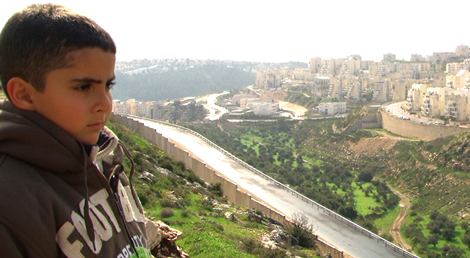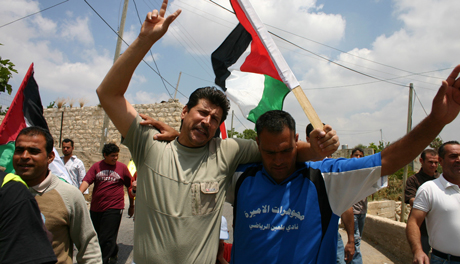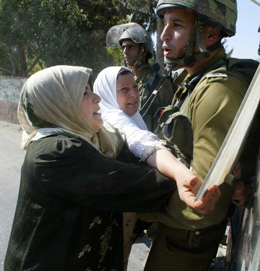
 |
|
|
|
Filmmaker-narrator Emad Burnat sounds like any husband and father anywhere when he tells us that he bought his first video camera in 2005 to take pictures of his newborn son, Mohammed. But Emad lives in Bil'in, a village in the Palestinian West Bank. His new camera would also chronicle the threat to Bil'in from Israeli settlers slowly stealing Palestinian land. The advantage held by Burnat's 5 Broken Cameras over other documentaries is of course its point of view. Much of the video and all of the commentary is by a Palestinian, a minority Israeli citizen whose media exposure is usually limited to news footage of demonstrations and riots. 5 Broken Cameras shows the insecurity of an ordinary town as their neighbors plot to overrun their olive groves, using the protection of Israeli courts and the Israeli army to push them off their own lands. 
Emad and his brothers and neighbors protest the unannounced construction of a concrete & barbwire fence that happens to bisect Palestinian fields and touches the outer edge of Bil'in. Even though it is their land on both sides of the fence, the Palestinians are given only very limited access. Meanwhile, Israeli setters, many of them religious extremists, begin building concrete apartment buildings that edge ever farther into the appropriated land. The film's narration asserts that Israeli courts have green-lit the construction in direct conflict with the law; with the addition of the barbed wire and armed patrols, the land grab is complete. The Palestinian protesters mount weekly demonstrations, shouting and making noise along the fence line. A few photojournalists and videographers go with them, but no Israeli news cameras are present. It isn't enough that the land is being taken; the army apparently has instructions to quell the demonstrations. The nonviolent protesters are targeted with tear gas, and eventually with bullets. Burnat's brothers and friends are held in jail or wounded; Israeli night raids seize men accused of throwing rocks at soldiers. They even detain some children. Emad himself is detained. The footage shows that rocks are thrown by Palestinians, not only during demonstrations but also whenever the Army Humvees patrol their neighborhoods. Emad's children grow up to perceive the occupying army as the enemy; their cute faces are often narrowed in wary, suspicious stares. Emad's wife Soraya criticizes him for risking himself and his family in the cause of making these videos, but she herself lectures the boys on the importance of resisting the occupiers. Some of Emad's buddies are real provocateurs, getting in the soldiers' faces and shaming them for what can only be seen as a government-encouraged crime. But the army has lethal weapons, and they use them. People and cameras are hit by gas canisters and bullets. One friend is shot through the legs, which puts him out of action for a full year. An army bullet also hits an Israeli, somehow. And eventually someone close to Emad is shot dead. 
Why does Emad persist? Because his camera is a propaganda tool, the only weapon at his disposal. The Israelis and their army fear it, or they would just ignore the protesters. With good pictures telling the right story, even a powerless man has a chance at influencing an unjust situation. Emad and Soraya have four sons, and as it works out Emad must buy a new camera more or less as each son is born -- they are broken one after another by the Israeli army. It is not just Burnat's video footage that we see. During one or two violent Army reactions, we see secondary coverage taken from within the ranks of the soldiers themselves. Although the narration in 5 Broken Cameras does not stress a group effort, several other videographers, including outside activists, contributed with Emad during the film's assembly. Emad's producing partner Guy Davidi is a Jewish Israeli, an activist videographer specializing in the Palestinian cause. Overall, the show has a professional feel and has been edited with care and finesse. The limited point of view only affords us brief glimpses of the Israelis. They are seen moving into new buildings and dropping trailers onto Palestinian land plots already isolated by the fence, as a quasi-legal "homesteading" gambit. More than once we see orthodox Jews rushing at the camera, threatening to sue, shouting that their rights are being compromised. The extremist settlers carry out their own night raids, burning olive trees as both insult and injury to the hated Palestinians. But when Emad is injured in a truck accident, he's taken to an Israeli hospital in Tel Aviv, where he's given excellent medical care. Emad himself says that at a Palestinian facility, he would probably have died. 
5 Broken Cameras concludes with a partial victory, when a court decision halts the construction of new Israeli buildings on misappropriated land and prohibits the occupation of homes that have already been completed. But from our knowledge of the region we know that rulings of this kind are only temporary, and the slow annexation of the Palestinian West Bank by Israeli settlers will continue. Emad Burnat and Guy Davidi's film makes it seem an inexorable, all too cynical process. Meanwhile, Emad, Soryaya and their growing sons get by as best they can. Kino Lorber's DVD of 5 Broken Cameras is a fine-quality encoding of a feature compiled from disparate video sources. When the cameras are damaged we see distorted or digitally spoiled footage, some of which looks to these eyes as if it might have been enhanced in post editorial. Plenty of source music shows up on the soundtrack. For extras Kino includes Guy Davidi's short film Keywords, about the staging of a play. Both Davidi and Emad Burnat sit for separate interviews about the production, and an original trailer wraps things up.
On a scale of Excellent, Good, Fair, and Poor,
5 Broken Cameras rates:
Reviews on the Savant main site have additional credits information and are often updated and annotated with footnotes, reader input and graphics.
Review Staff | About DVD Talk | Newsletter Subscribe | Join DVD Talk Forum |
| ||||||||||||||||||